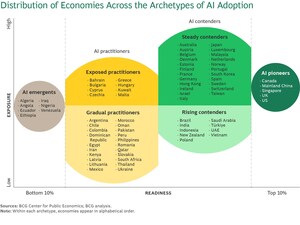MUNICH, Sept. 25, 2019 /PRNewswire/ -- As concerns about the onset of a global recession increase, M&A dealmakers should take heart: a recent study by Boston Consulting Group (BCG) in collaboration with Professor Sönke Sievers of Paderborn University finds that acquirers generally see higher returns from deals made in a weak economy. The findings are detailed in BCG's 2019 M&A report, Downturns Are a Better Time for Deal Hunting, released today.
"Dealmakers can take advantage of downturn opportunities to position their company for profitable growth during the recovery," said Jens Kengelbach, a BCG senior partner, the firm's global head of M&A, and a report coauthor. "Our findings demonstrate the importance of being bold and staying the course, even in the face of negative investor sentiment caused by a weak economy."
Dealmakers Perform Better in Downturns, but Experience Matters
Dealmakers are bracing for a downturn against the backdrop of softening investor support for M&A. Acquirers' cumulative abnormal returns (CARs) centered on the announcement date fell to an average of –0.4% in 2018. Although it is well above the historical average of –1.1%, this negative figure represents a reversal of the recent trend that saw investors placing their bets on dealmakers. "For the first time since 2011, CARs were negative for acquirers of public targets in 2018—an indication that investor sentiment toward M&A is returning to the old normal," said Kengelbach.
Even if a downturn occurs, dealmakers should not be deterred. The study found that, in the medium term, deals made in a weak economy create more value for buyers than those made in a strong economy. One year after an acquisition, buyers' relative total shareholder return (RTSR) is nearly 7 percentage points higher for weak-economy deals than for strong-economy deals. After two years, the differential increases to more than 9 percentage points. (RTSR is a company's total shareholder return compared with its sector index.)
Boldness pays off, as the outperformance is driven largely by acquisitions outside the buyer's industry (that is, noncore deals). In a weak economy, noncore deals create more value than core deals: 1-year RTSR is 3.9 percentage points higher. "Although core deals are received more favorably by capital markets around the announcement date, medium-term value creation is higher for companies making bold moves to acquire attractive targets beyond their core industry," said Georg Keienburg, a BCG partner and a report coauthor.
In a strong economy, by contrast, noncore deals destroy value for the buyer (RTSR of –1.0%), while core deals preserve value (RTSR of 0.0%). "In good economic times, investors apparently prefer that companies focus on their core businesses so that they can realize the synergies required to justify high purchase prices. But in weak economic times, they want companies to diversify and add new businesses that position them for growth in the recovery," said Keienburg.
Although occasional buyers can create value through acquisitions in weak economies, experienced buyers outperform by a wide margin. Experienced buyers can create value from M&A in any economic environment (2-year RTSR of 7.3% in a weak economy versus 1.1% in a strong economy). Occasional buyers are able to create some value from M&A in a weak economy (2-year RTSR of 1.4%), but they destroy value in good economic times (2-year RTSR of –13.8%).
The study analyzed a unique data set totaling more than 51,600 deals over the past 40 years, out of BCG's total M&A database of more than 750,000 deals.
How to Master M&A in a Downturn
To master M&A in a downturn, the authors recommend that buyers:
- Get prepared. Putting in place an ongoing target screening process that covers strategic priority fields is a no-regrets move. If the economy remains strong, the company can act quickly if a buying opportunity (such as a private equity exit) arises. And if the economy weakens, targets may be available at bargain prices.
- Boldly pursue downturn M&A opportunities if they materialize. Downturns are, on average, good times to make deals.
- Use transformational deals to stay ahead of the curve. Downturn M&A enables companies not only to react to a changing environment but also to accelerate out of the recession when the economy gains traction.
A copy of the report can be downloaded here.
To arrange an interview with one of the authors, please contact Eric Gregoire at +1 617 850 3783 or [email protected].
About Boston Consulting Group
Boston Consulting Group partners with leaders in business and society to tackle their most important challenges and capture their greatest opportunities. BCG was the pioneer in business strategy when it was founded in 1963. Today, we help clients with total transformation—inspiring complex change, enabling organizations to grow, building competitive advantage, and driving bottom-line impact.
To succeed, organizations must blend digital and human capabilities. Our diverse, global teams bring deep industry and functional expertise and a range of perspectives to spark change. BCG delivers solutions through leading-edge management consulting along with technology and design, corporate and digital ventures—and business purpose. We work in a uniquely collaborative model across the firm and throughout all levels of the client organization, generating results that allow our clients to thrive.
SOURCE Boston Consulting Group (BCG)
Related Links
WANT YOUR COMPANY'S NEWS FEATURED ON PRNEWSWIRE.COM?
Newsrooms &
Influencers
Digital Media
Outlets
Journalists
Opted In




Share this article